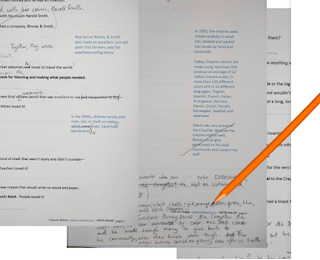PICTURE BOOK FOCUS: A great editor makes all the difference

Picture book author Natascha Biebow shares how
a really great editor can make your story shine.
Submitting your manuscripts can be a very frustrating experience. You wait and wait and wait . . . and, if you’re lucky to get a reply, you might get a form rejection. You’re none the wiser. Also, you might wonder, what are those editors doing all day long? Why aren’t they quicker to reply? What does an editor do anyway?
Or if you’re thinking of self-publishing, you might also wonder: do you really need an editor? Can’t you just self-edit your book and get it illustrated and published?
Yes, you can
self-edit, but there are limits to this because it’s practically impossible to
see your work totally objectively – you are too close to it.
 |
| You can try to self-edit your manuscript, but . . . |
When you work with
a good professional editor, you will experience the transformative power of how
they can help you to polish your work.
This can be the difference between a book that hooks in young readers, the one they want to hear over and over again, and the book that disappears without trace.
A good edit can
make your story soar!
 |
| Illustration by Lizzie Finlay |
Editors act like objective FIRST READERS:
They read the book from an impartial angle and give you a fresh perspective.
No writer can find all the mistakes in their own writing. Perhaps you’ve experienced this. You know your book is just not working, but you can’t figure out WHY?!
A professional editor can quickly identify what the problem is. Now that you know, you wonder, why on earth couldn’t you see it before – it’s so obvious!
Editors have VISION:
When expert editors
receive a manuscript or a picture book dummy, they will often have a vision for
what the final book will be like. They can work with you to help shape the
words and pictures to make it happen! Their knowledge will help to match your
text with the right illustrator, working alongside experienced designers. They
can see how the rough material will become a gem that parents and children will
love to read.
 |
| Editors can help you create a book that is a lasting gem. |
Editors SHAPE the story:
Importantly, editors offer a professional eye on your work gained through years of experience and knowledge of the market and target audience for your book.
They know how to bring out the theme, strengthen the plot and characters’ emotional arcs, the voice, the patterns – everything you need to make an excellent picture book.
Editors know the MARKET:
Based on their comprehensive knowledge of the marketplace, editors can help you to figure out where your book will sit among the competition. They can point you towards mentor texts and help you to get unstuck and develop your book idea so it is commercial and fits within the conventions of the current bookselling market. They will identify formats that will enhance your idea.
Editors help you find your HOOK:
Editors are highly-trained to understand the marketplace, your target audience, and are able to distill your story into a two-line pitch that will quickly tell people:
· What the book is about
· The genre and target age group
· Why people should buy it
· Why it’s different from the competition
· What’s special about it
· Why this author/illustrator is the ticket for this book
 |
| Editors know how to help you hook in your reader (and the gatekeepers). |
Editors are also
experienced in writing compelling back cover and other sales copy that will help
to grip consumers and get them to pick up your book. This same sales copy is
also instrumental in championing the book in-house all the way from the
acquisitions meeting through to the bookshop.
If you don’t have a solid unique selling point and hook for your story, it is likely it needs more editorial shaping!
You can TRUST your Editor!
Editors work in confidence with you – they will never share your idea or copy it! Your relationship with an editor is based on an understanding that a creator’s idea is unique and their copyright.
Editors LISTEN:
Editors listen to why you are writing or illustrating this book, what inspired the story, and help you to shape your ideas. Sometimes, they’ll send you back to the drawing board, provide you with mentor text inspiration or encourage you to re-think . . . They don’t have the answers. They want you to find the solutions. How frustrating! But at the end of the day, editors most want to empower you to make an excellent book that only you can create!
Editors can help you figure out where you are going WRONG:
If you keep getting rejections or a story just won’t come together, editors are trained to read manuscripts and envision the audience. Experienced editors are trained to identify common mistakes and even more importantly, they know how to fix them! They can often suggest several options for solving problems with scenes, structure, characterisation and words.
Editors can help you CUT stuff:
If you’re too close to your work, it can be really hard to let go of lovely words and pet phrases to which you’re attached. But editors are impartial and objective. They can look at the whole and see what is serving your story and what is not. They will be honest with you, even if you might not want to hear their feedback at first.
Editors CHECK everything:
• Consistency – of everything! Voice, character and plot, words & pictures, prelims
• Pacing & page turns
• Grammar and punctuation
• Voice and tone
• Rhythm, rhyme and scansion
• Child-centred-ness
• Your title & cover – that the image fits the story vision and does what it says on the tin
• Lots of other stuff, big and small
Editors know how
to HELP YOU BECOME A BETTER WRITER:
Experienced editors don’t just know how to edit, they know how to communicate
their comments, suggestions and critical feedback so that it can help YOU.
Clear and concise feedback that is accessible and encouraging is key to
nurturing writers and enabling them to get unstuck so that they can tell the
story they want to tell.
Editors understand that this isn’t their book – it’s always the author’s (or
author/illustrator’s)!
They know that YOU are the one with the solution and empower you to create your best work.
Editors equip you with TOOLS:
You can use what
you learn from each bit of feedback and editorial shaping and add it to your
revision and craft tool box and apply it to whatever you work on next.

Editors are your
FRIEND and CHAMPION:
They will help you tell the stories you want to tell and
try to find a way to get them to market. At publishing houses, editors spend a
lot of time championing your work to all the other departments in-house,
including the publisher, the sales and foreign rights sales teams, marketing
and publicity departments, teachers, librarians and booksellers.
Freelance
literary consultants and editors do the same by championing your work to
agents, editors and others who can bring the book to market, or by shaping your
work for self-publication.
Editors are
passionate about STORY and really want to help you!
_____________________________________________________________________
* Logo of animals cooking: by kind permission of Lizzie Finlay












No comments:
We love comments and really appreciate the time it takes to leave one.
Interesting and pithy reactions to a post are brilliant but we also LOVE it when people just say they've read and enjoyed.
We've made it easy to comment by losing the 'are you human?' test, which means we get a lot of spam. Fortunately, Blogger recognises these, so most, if not all, anonymous comments are deleted without reading.